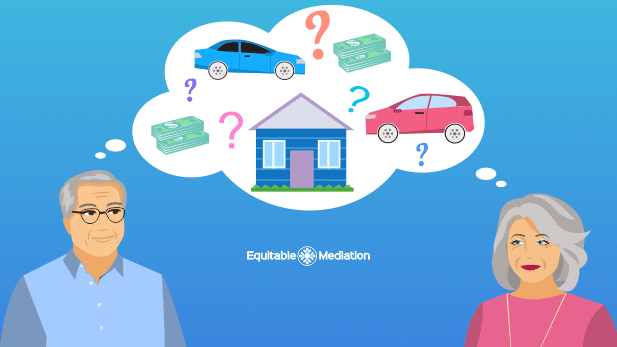Gray divorce can be a challenging and complex experience.
As experts in divorce mediation, we've helped many couples divorce after 50.
And in this article we'll share:
Let's get started.
What is Gray Divorce?
Gray divorce is a term used to describe divorce later in life.
Over the past 20 years, the divorce rate in the United States has declined. But for those aged 50 and older, the gray divorce rate has actually doubled according to a paper, “Gray Divorce: A Growing Risk Regardless of Class or Education” written by two sociologists at Bowling Green State University – Susan L. Brown and I-Fen Lin.
Furthering the research into gray divorce statistics, according to an April 2021 report released by the U.S. Census Department, 34.9% of all Americans who got divorced in the previous calendar year, were age 55 or older. That's more than twice the rate of any other age group surveyed.
When the term grey divorce (meaning divorce later in life) was first coined, it referred to older couples who divorce after 40 years of marriage (or more). The assumption was that anyone married for that long must be "starting to gray," hence the name.
But these days, gray divorce refers to the phenomenon of increased divorce rate among couples in a long-term marriage, regardless of the color of their hair.
As a point of reference, most of our clients falling into this category are pursuing divorce after 25 or 30 years of marriage.
Gray Divorce Regrets
Gray divorce regrets include loss of companionship, loss of health insurance, having to return to the workforce, and a lower standard of living, among many other things.
Factors Contributing to Gray Divorce
The Spouses Have Grown Apart
In a grey divorce (or silver divorce,) there is often no infidelity and no major blowout that led to the decision to get divorced. Instead, the spouses have simply grown apart over time.
The couple chooses to begin divorce proceedings when one of two things happens:
They've spent the better part of their marriage raising kids and now they no longer have the children to focus on.
Suddenly, they find themself uncomfortable being around this spouse they no longer know.
- Divorce after Retirement.
When a couple is working and/or raising kids, they're busy.
Perhaps so busy that they don't notice they're growing farther apart with each passing year.
But now that one or both have retired, they have a lot more time on their hands and again, realize they no longer know (or like) their husband or wife.
Differing Attitudes Towards Aging
We've all got one (or maybe more) of those friends who every time we ask them how they are, they launch into how bad their feet hurt, or how they pulled their back out, or how their eyesight isn't what it used to be.
I get it - aging stinks.
But being around someone who acts old can make us feel old.
For some, when their husband or wife repeatedly complains, it can be an unwelcome reminder that they're getting older, too.
And they think if they get divorced and marry someone younger, it will reverse time.
One Spouse Focusing on Self-Improvement
There's a great line from the Bruce Springsteen song "Dancing in the Dark" that goes:
"I check my look in the mirror, I want to change my clothes, my hair, my face..."
After so many years of looking, dressing, or feeling the same way, some people want to make changes to the way they are living their life.
While others don't.
And it's this incompatibility that leads to divorce.
Finances and Incompatible Spending Habits
When couples are in their prime earning years, a lot of financial missteps can be overlooked.
But once the income stream stops and the couple is forced to live on a fixed income, pension plan, or other retirement benefits, it can be quite sobering.
Differences in spending habits become abundantly clear. And may lead to one spouse wanting to get divorced.
Sex Drive Incompatibility
Just like differences in spending habits, differences in sex drives can also sink a marriage.
As spouses get older, their libidos can change, sometimes dramatically.
Which can lead to frustration, and ultimately the desire to divorce.
Longer Life Expectancy and Pursuit of Happiness in This Stage of Life
According to data compiled by the Social Security Administration as of 2021:
- A man reaching age 65 today can expect to live, on average, until age 84.3.
- A woman turning age 65 today can expect to live, on average, until age 86.6.
- About one out of every four 65-year-olds today will live past age 90.
- One out of 10 will live past age 95.
For couples seeking a senior divorce, it's quite possible each spouse could live another 30, 40 even 50 years.
So one might feel, "Why spend the time I have left on this earth miserable in an unhappy marriage?"
Leading them to want a divorce.
They Married The Wrong Person
"Try to marry a nice boy."
"Find a woman who will be a good mother to your children."
Sometimes choices made earlier in life are heavily influenced by messages received from others.
And as the years go by, and they reflect on their life, one or both spouses realize they're unhappily married.
So they decide to divorce.
Lifestyle Incompatibilities - Active vs. Passive
"He just wants to sit on the couch and watch TV, but I want to go on cruises, get dressed up, and dance!"
"She just wants to sit home all day doing crossword puzzles, but I want to go on vacation and see all those places we talked about going to but never did!"
When one spouse wants an active retirement and one doesn't, it can become a real problem.
And lead to divorce.
Signs of Gray Divorce
Signs of gray divorce include:
- Self-improvement - one spouse begins focusing on their appearance. That might mean exercising, losing weight, or dressing differently.
- Spouses prefer the company of others instead of wanting to spend time together.
- Communication has broken down with no desire to fix it.
- The fighting has stopped and now, spouses are indifferent towards each other.
In short, the spouses are no longer connected.
Gray Divorce Reasons
The reasons for gray divorce have to do with the societal shift and quest for personal fulfillment that began in the late 1960s and continued throughout the 1970s.
It was during that time that attitudes towards divorce became more socially acceptable. TV shows like Maude (1972) and One Day at a Time (1975) featured main characters who were divorced, and Kramer vs. Kramer (1979) was a box-office smash.
Divorce became "normal."
Baby boomers born in the late 1950s through early 1960s grew up with the messages that life is short, happiness matters, and divorce is nothing to be ashamed about. Which set the stage for the gray divorce revolution we're seeing today.
Emotional Impact of Gray Divorce
Grief and Loss
Divorce is the death of a marriage. And after any significant loss, usually comes grief.
For what was and will never be.
If you and your spouse slowly drifted apart, you may think going through a gray divorce is no big deal.
But experiencing this type of loss can be profound. And should not be underestimated.
Legacy Concerns
How your children, family, and friends will remember you becomes more important as you age.
In some cases, divorcing later in life may have a negative impact on a person's legacy. And how they're viewed after they're gone.
While the financial impact of a divorce can have a significant impact on one's ability to provide to the next generation a financial windfall.
Together, these two legacy issues can lead to feelings of depression and sadness.
Cognitive Decline
Cognitive decline is considered a natural part of the aging process.
But losing our life partner has been shown to speed up cognitive decline.
A 2020 research paper published on the JAMA Open Network titled “Associations of Widowhood and β-Amyloid With Cognitive Decline in Cognitively Unimpaired Older Adults” suggested that widowhood was associated with faster cognitive decline among older adults, especially in the first year after spousal loss.
In this case, the emotional impact of a gray divorce can also have a significant physiological one as well.
Tips for Maintaining Health and Wellness During Gray Divorce
You might think maintaining health and wellness during gray divorce is all about your physical health. Like staying active, eating right, and going to the doctor for regular check-ups.
But there’s also mental health, such as attending therapy, joining support groups, setting goals, and pursuing hobbies,
There’s social wellness staying in touch with friends and family, making new friends, volunteering, and dating.
Financial wellness such as educating yourself about your personal finances, consulting with a financial advisor familiar with gray divorce, budgeting to reflect your new circumstances, and planning for the future to adjust your retirement plans.
Finally, there’s personal growth such as self-reflection, learning new skills, travelling, and journaling.
All of these things (and more) can put you on (and keep you on) the path to long-term health and wellness.
Alternatives to Gray Divorce
One alternative to a gray divorce is to continue being married and living together. For these couples, they still care for each other, but have different interests. So, they decide to carry on as if they were married, sharing both a home and finances, but lead separate lives.
The second alternative is to continue being married and living together, but separate finances. Because of differences in spending styles, and handling of money, these couples choose to remain physically together, but financially separate. Maintaining separate bank accounts, credit cards, etc.
And third, is to separate and live apart without getting a divorce. For these couples, they no longer wish to cohabitate, or share finances, so they establish separate residences, divide their assets and debt, and become separate entities.
Therapeutic Issues in Gray Divorce
Family Dynamics
There’s a common misconception that adult children take the news of their parent’s divorce better than younger ones.
But in reality, it’s the opposite.
Spouses divorcing after a long-term marriage should be mindful of the impact their divorce will have on their children and family dynamics.
Which may require them to sit with their adult children and share the news together, or even attend family therapy.
Loss of Identity
If the saying “you are the average of the five people you spend the most time with” is true, couples in long-term marriages play a significant part in shaping each other’s identity.
So when divorcing after decades of marriage, spouses may struggle to redefine themselves as single.
Or understand who they are without the other spouse.
Social Isolation
Marriage usually means companionship. Whether from your spouse, or your mutual circle of friends.
But when divorcing after many years, longstanding social circles may disappear, as friends “pick sides” or couples no longer want to spend time with someone who’s “single.”
Which can lead to feeling of loneliness and isolation.
Grey Divorce Mediation
The longer a couple has been married, the more complicated their divorce issues become.
If you're facing a gray divorce, mediation is an ideal option to peacefully and cost-effectively end your marriage.
To get you thinking about some of the issues you might face, here are 7 things you need to know before your divorce negotiations begin.
This way, you can make sure they're addressed during your negotiations.
And increase your chances of a fair and equitable divorce.
Not Taking Total Compensation into Account During Alimony Negotiations
Chances are the spouse who will be paying alimony in a gray divorce is late in their career. And their compensation includes more than just a base salary.
That means including things like:
- Bonuses;
- Restricted stock units;
- Options;
- Ownership stakes;
- Executive compensation packages;
- Car allowances;
- Travel perks;
- Etc.
When negotiating an amount of alimony in a gray divorce, the total compensation received needs to be considered.
Assuming All Assets are 100% Marital Property
Let’s say an individual got married at 40 and has a 401(k) plan they've been contributing to since they were 25.
In this case, part of their 401(k) value was accumulated prior to their marriage. And part of it during.
So, just because a couple has been in a long term marriage, it doesn’t mean the full value of everything they own should automatically be included in their negotiations.
Allowing a Potential Inheritance to Influence Your Negotiation Strategy
During negotiations, one spouse might say “you're going to get money from your parents. So I should get more of the retirement accounts.”
To which the other spouse typically replies, “I don’t know what I’ll get - if anything. I've got brothers and sisters and my parents like them more than me!”
Inheritances can help secure a recipient's financial future when received.
But nothing about them is guaranteed. The amount, the timing, none of it.
Thinking Social Security Benefits will be Equal
In a divorce after a long-term marriage, one party can apply for Social Security benefits using the other party's earnings. Provided they meet certain requirements.
During negotiations, the lower-earning spouse might be expecting to share equally in the other spouse's Social Security benefits.
But the benefit amount they can receive is limited. And may still leave them with an income disparity.
Forgetting to Discuss What Will Happen if the Spouse Paying Alimony Predeceases the Spouse Receiving it
When alimony is involved in a divorce agreement, it’s a good idea to have a plan for what happens if during the term of alimony, the paying spouse dies.
This way the recipient will be made whole, and get the full amount of what they negotiated.
Not Properly Valuing Pension Plans
While many companies have moved away from pension plans in favor of 401(k)'s, there are still employers who offer them.
So if one or both spouses have a pension, but they're not currently receiving payments, they need to be valued by a specialist for the purposes of divorce negotiations.
Just because a pension is not being paid out yet, they still have a value.
And some are quite significant!
Other Useful Resources:




